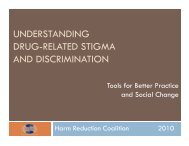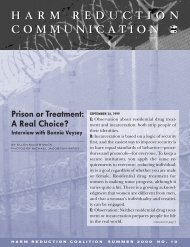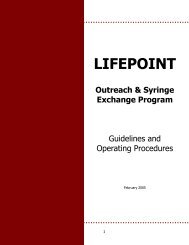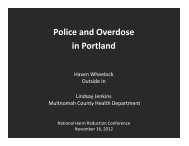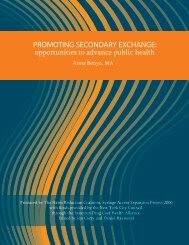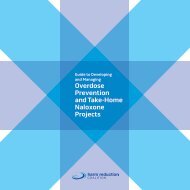9th - Harm Reduction Coalition
9th - Harm Reduction Coalition
9th - Harm Reduction Coalition
You also want an ePaper? Increase the reach of your titles
YUMPU automatically turns print PDFs into web optimized ePapers that Google loves.
<strong>9th</strong><br />
National <strong>Harm</strong> <strong>Reduction</strong> Conference<br />
FROM PUBLIC HEALTH TO SOCIAL JUSTICE<br />
Dobbins, Sarah, Independent, San Francisco, CA<br />
sarahdobbinsillustration@gmail.com<br />
Using Visual Communication in Community Health Outreach: Insights from a Multidisciplinary Collaboration in <strong>Harm</strong><br />
<strong>Reduction</strong>.<br />
What can we gain from the collaboration of artists and health care professionals Can visual communication improve education,<br />
outcomes and interventions in public health and social justice movements These are questions that we will address<br />
in a panel discussion about the feasibility of a multidisciplinary approach to community health outreach. We aim to highlight<br />
not only the feasibility, but the importance of such an approach. Drawing on the experiences of a recent project aimed at<br />
improving drug overdose harm reduction training, we will discuss the process of integrating visual communication into<br />
community health outreach. The specific aims of the discussion include: 1) Relating our particular experience of collaboration<br />
in harm reduction training and education; 2) Discussion of barriers and successes in integrating visual communication<br />
and preventative healthcare for the community; 3) Act as a resource for answering logistical as well as theoretical questions<br />
about such collaborations based on our individual expertise and experience with the project; and 4) Invite discussion<br />
of future directions as well as areas of public health, activism, and social justice that may benefit from a multidisciplinary<br />
approach.<br />
Sarah Dobbins is a scientific artist & illustrator and a public health researcher at SFGH. She has been developing a practice that<br />
combines art and science with the goal of improving health and access for vulnerable populations. She graduated from Marlboro<br />
College with a dual degree in Art and Biology. She completed a Masters in Public Health at the University of Pittsburgh Graduate<br />
School of Public Health, and later, a post-baccalaureate year at the School of the Museum of Fine Arts Boston.<br />
Dodd, Zoe, South Riverdale Community Health Centre, Toronto, Ontario, Canada<br />
zdodd@srchc.com<br />
Community Arts and <strong>Harm</strong> <strong>Reduction</strong>: Promoting Health, Building Community, Creating Change.<br />
Art has been an integral tool used in harm reduction initiatives in East Toronto to engage street-involved and homeless<br />
people who use drugs in storytelling, creating, remembering, healing and advocacy to address stigma and discrimination,<br />
and to create social and political change. Our presentation will discuss different community arts initiatives by people who<br />
use drugs, including a paper-mache mask project with women survivors of trauma, a meditation painting group, storytelling<br />
with women who have lost custody of their children, body mapping and photo voice by people living with hepatitis C, and the<br />
creation of a public memorial monument to raise awareness of the Drug War and commemorate loved ones who have died.<br />
Approaching art and activism as important social determinants of health in our communities, our graphically facilitated presentation<br />
will weave together learning’s from our arts-based initiatives. We will discuss ways in which arts participation has<br />
contributed to health, community empowerment, social connectedness, and presented opportunities for addressing issues<br />
of inequality, stigma, poverty and social exclusion.<br />
“The Meaningful Involvement of People with the lived experience of HCV in an Interdisciplinary Model of Treatment,<br />
Care and Support.”<br />
The meaningful involvement of people with lived experience of HCV has been critical to the success of the East Toronto<br />
Hepatitis C Program (ETHCP) with important impacts for clients, health care providers and the larger community. The<br />
ETHCP is a community-based, interdisciplinary model of Hepatitis C treatment, group support and education for homeless<br />
and low-income individuals primarily for people who actively use drugs and/or have mental health issues and/or HIV<br />
co-infection. The program has been offering health care, treatment and support since 2006 and is a partnership between<br />
three community health centres, with specialist support from nearby hospitals. This presentation will focus on the role of<br />
peer support and on the meaningful participation of people with the lived experience of HCV in the development, implementation<br />
and direct service provision of this innovative model of HCV treatment. It will explain how the integrated peer<br />
support, training and advisory components of the ETHCP has improved Hep C treatment uptake and care, as well as their<br />
34



